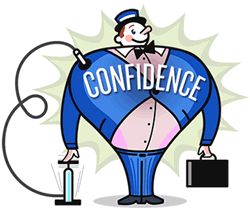Lack of Sleep Pumps Up Overconfidence Bias
Thursday, March 24th, 2011 When predicting outcomes most people tend to overestimate the chances of a positive outcome and underestimate the chances of a negative outcome. This optimism bias is at the root of gambling fallacies and shapes an array of predictions ranging from ill effects of smoking to corporate earning estimates and how well you will do on a test.
When predicting outcomes most people tend to overestimate the chances of a positive outcome and underestimate the chances of a negative outcome. This optimism bias is at the root of gambling fallacies and shapes an array of predictions ranging from ill effects of smoking to corporate earning estimates and how well you will do on a test.
For cognitive designers working in the area of decision support, the overconfidence bias is a tricky issue. You want to mitigate its effect but not make your solution too conservative.
One way of mitigating its effects was recently uncovered by researchers at Duke University Health Center. Using brain scanning studies they found that the overconfidence bias is magnified when decision maker do not get enough sleep.
“The scientists showed, using a functional MRI, that a night of sleep deprivation leads to increased brain activity in brain regions that assess positive outcomes, while at the same time, this deprivation leads to decreased activation in the brain areas that process negative outcomes.”
This suggest making economic decision early in the day or when fully rested may help to avoid the effects of the optimism bias.